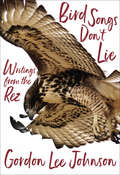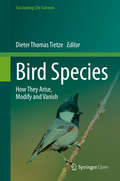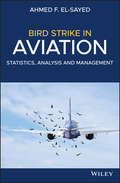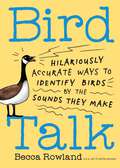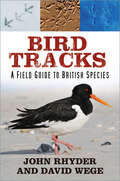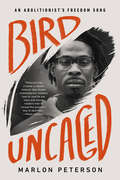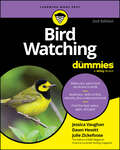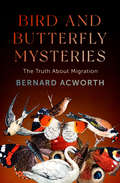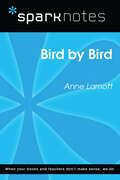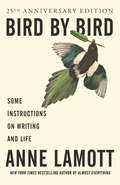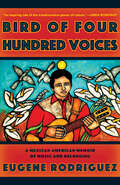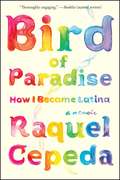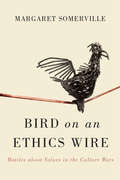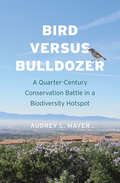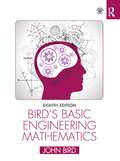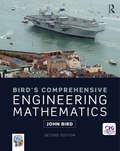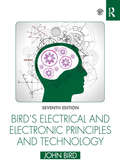- Table View
- List View
Bird Show
by Susan StockdaleWelcome to the Bird Show! Award-winning author-illustrator Susan Stockdale offers a front-row seat to a vibrant fashion show starring the world's most diverse and spectacular birds.Just like people, birds contribute to our beautiful world, made more vibrant by their diversity. Readers will marvel at the unique "clothes" worn by eighteen familiar and exotic birds in Susan Stockdale's colorful book. With feathers both plain and fancy, spotted and striped, birds' magnificent differences are celebrated in her stunning portraits and lyrical, rhyming text. Future ornithologists and fashionistas will marvel at the book's color and style, and an afterword provides more information about each species as well as an entertaining pattern matching game.
Bird Songs Don't Lie: Writings from the Rez
by Gordon Lee JohnsonIn this collection of essays and short stories, the Native American author explores reservation life through a range of genres and perspectives.In this moving collection, Gordon Lee Johnson (Cupeño/Cahuilla) distinguishes himself not only as a wry commentator on American Indian reservation life but also as a master of fiction writing. In Johnson’s stories, all of which are set on the fictional San Ignacio reservation in Southern California, we meet unforgettable characters like Plato Pena, the Stanford-bound geek who reads Kahlil Gibran during intertribal softball games; hardboiled investigator Roddy Foo; and Etta, whose motto is “early to bed, early to rise, work like hell, and advertise,” as they face down circumstances by turns ordinary and devastating.The nonfiction featured in Bird Songs Don’t Lie is equally revelatory in its exploration of complex connections between past and present. Whether examining his own conflicted feelings toward the missions as a source of both cultural damage and identity or sharing advice for cooking for eight dozen cowboys and -girls, Johnson plumbs the comedy, catastrophe, and beauty of his life on the Pala Reservation to thunderous effect.
Bird Species: How They Arise, Modify and Vanish (Fascinating Life Sciences)
by Dieter Thomas TietzeThe average person can name more bird species than they think, but do we really know what a bird “species” is? This open access book takes up several fascinating aspects of bird life to elucidate this basic concept in biology. From genetic and physiological basics to the phenomena of bird song and bird migration, it analyzes various interactions of birds – with their environment and other birds. Lastly, it shows imminent threats to birds in the Anthropocene, the era of global human impact. Although it seemed to be easy to define bird species, the advent of modern methods has challenged species definition and led to a multidisciplinary approach to classifying birds. One outstanding new toolbox comes with the more and more reasonably priced acquisition of whole-genome sequences that allow causative analyses of how bird species diversify. Speciation has reached a final stage when daughter species are reproductively isolated, but this stage is not easily detectable from the phenotype we observe. Culturally transmitted traits such as bird song seem to speed up speciation processes, while another behavioral trait, migration, helps birds to find food resources, and also coincides with higher chances of reaching new, inhabitable areas. In general, distribution is a major key to understanding speciation in birds. Examples of ecological speciation can be found in birds, and the constant interaction of birds with their biotic environment also contributes to evolutionary changes. In the Anthropocene, birds are confronted with rapid changes that are highly threatening for some species. Climate change forces birds to move their ranges, but may also disrupt well-established interactions between climate, vegetation, and food sources. This book brings together various disciplines involved in observing bird species come into existence, modify, and vanish. It is a rich resource for bird enthusiasts who want to understand various processes at the cutting edge of current research in more detail. At the same time it offers students the opportunity to see primarily unconnected, but booming big-data approaches such as genomics and biogeography meet in a topic of broad interest. Lastly, the book enables conservationists to better understand the uncertainties surrounding “species” as entities of protection.
Bird Strike in Aviation: Statistics, Analysis and Management
by Ahmed F. El-SayedGroundbreaking Handbook Offers Detailed Research and Valuable Methodology to Address Dangerous and Costly Aviation Hazard Though annual damages from bird and bat collisions with aircraft have been estimated at $400 million in the United States and up to $1.2 billion in commercial aviation worldwide and despite numerous conferences and councils dedicated to the issue, very little has been published on this expensive and sometimes-lethal flying risk. Bird Strike in Aviation seeks to fill this gap, providing a comprehensive guide to preventing and minimizing damage caused by bird strike on aircraft. Based on a thorough and comprehensive examination of the subject, Dr. El-Sayed offers different approaches to reducing bird strikes, including detailed coverage of the three categories necessary for such reduction, namely, awareness/education, bird management (active and passive control), and aircraft design. In addition, the text discusses the importance of cooperation between airplanes, airports and air traffic authorities as well as testing methods necessary for certification of both aircraft frame and engine. Other notable features include: Statistics and analyses for bird strikes with both civil and military helicopters as well as military fixed wing aircrafts, including annual costs, critical flight altitudes, critical parts of aircraft, distance from air base and specifics of date and timing Thorough review and analysis all fatal bird strike accidents and most non-fatal accidents since 1905, the first book to provide such a reference The use of numerical methods in analyzing historic data (ex. probability functions, finite element methods for analyzing impact on aircraft structure, experimental measurement technique for displacement, vibration, component distortion, etc.) Instruction on identification of bird species (using visual, microscopic, and DNA evidence) and details of bird migration to aid air traffic control in avoiding scenarios likely to result in collision With its wealth of statistical data, innovative research, and practical suggestions, Bird Strike in Aviation will prove a vital resource for researchers, engineers and graduate students in aerospace engineering/manufacturing or ornithology, as well as for military and civilian pilots and flight crew or professionals in aviation authorities and air traffic control.
Bird Student: An Autobiography
by George Miksch SuttonAt thirteen, George Miksch Sutton planned a school of ornithology centered around his collection of bird skins, feathers, bones, nests, eggs, and a prized stuffed crow. As an adult, he became one of the most prominent ornithologists and bird artists of the twentieth century. He describes his metamorphosis from amateur to professional in Bird Student. Born in 1898, Sutton gives us his clearest memories of his boyhood in Nebraska, Minnesota, Oregon, Illinois, Texas, and West Virginia with his closely knit family. Recognizing birds, identifying them correctly, drawing them, and writing about them became more and more important to him. His intense admiration for Louis Agassiz Fuertes had a good deal to do with his beginning to draw birds in earnest, and his correspondence and his 1916 summer visit with the generous Fuertes taught him to look at birds with the eyes of a professional artist and to consider the possibility of making ornithology his career. By 1918, Sutton had talked himself into a job at the Carnegie Museum of Natural History in Pittsburgh, which gave him fresh opportunities to learn and travel, and his 1920 field trip to the Labrador Peninsula stimulated his lifelong interest in arctic birds. Further expeditions to James Bay, the east coast of Hudson Bay—on leave from his job as state ornithologist of Pennsylvania—and Southampton Island at the north end of Hudson Bay, in search of the elusive blue goose and its nesting grounds, give us glimpses of field methods before the days of sophisticated equipment. Sutton ends his autobiography in 1935, with an account of his graduate days at Cornell University and his position as curator of the Fuertes Memorial Collection of Birds. Bird Student is about raising young roadrunners and owls and prairie dogs, sailing (and being stranded) in arctic waters, preparing specimens in the hold of a ship, hunting birds and caribou and bears in almost inaccessible regions, canoeing in the Far North, camping in Florida, and delivering speeches in Pennsylvania. Sutton's gift for mixing facts and philosophy lets us see the evolution of a naturalist, as his inherent curiosity and innocent enjoyment of beauty led to a permanent desire to preserve this beauty.
Bird Study (Merit Badge Series)
by Boy Scouts of AmericaThis book introduces scouts to the wonders and joys of bird watching and study.
Bird Talk: Hilariously Accurate Ways to Identify Birds by the Sounds They Make
by Becca RowlandA hilarious, informative, and vibrantly illustrated guide to 101 bird songs that sound surprisingly familiar. Have you ever gone for a walk in the woods and wondered what bird was making a sound like a siren going off, or somebody revving a chainsaw engine—or sneezing? Do you hear birds every day, in the park or your neighborhood, but never know quite what you are listening to? Birds are singing all around us, and author and illustrator Becca Rowland, aka Girl in White Glasses, connects the dots between their songs and the birds who make them, helping you to easily identify and remember their calls. Combining illustrations of common and rare birds with fascinating facts and whimsical descriptions of their calls, this book is full of humor and charm. From space lasers to cheeseburgers, Bird Talk introduces you to the weird and wonderful world of bird songs. This publication conforms to the EPUB Accessibility specification at WCAG 2.0 Level AA.
Bird Tracks: A Field Guide to British Species
by John Rhyder David Wege"A wonderful book that shares rare knowledge in a clear and focused way. I love it." - Tristan GooleyBird Tracks: A Guide to British Species explores and enhances the ability to identify a diversity of birds using just their tracks and trails. John Rhyder and David Wege approach this subject from the perspective of both the tracker and the birdwatcher. They have examined and described 139 species, each richly illustrated with a mixture of photographs and drawings of their unique tracks and trails.Bird Tracks is a comprehensive guide for trackers and birdwatchers interested in studying species found around the British Isles, and can also be of great use across north-western Europe. Written by experts in their respective fields, this work represents several years of research collated into the most in-depth study of bird tracks published to date.
Bird Uncaged: An Abolitionist's Freedom Song
by Marlon PetersonFrom a leading prison abolitionist, a moving memoir about coming of age in Brooklyn and surviving incarceration—and a call to break free from all the cages that confine us. Marlon Peterson grew up in 1980s Crown Heights, raised by Trinidadian immigrants. Amid the routine violence that shaped his neighborhood, Marlon became a high-achieving and devout child, the specter of the American dream opening up before him. But in the aftermath of immense trauma, he participated in a robbery that resulted in two murders. At nineteen, Peterson was charged and later convicted. He served ten long years in prison. While incarcerated, Peterson immersed himself in anti-violence activism, education, and prison abolition work. In Bird Uncaged, Peterson challenges the typical &“redemption&” narrative and our assumptions about justice. With vulnerability and insight, he uncovers the many cages—from the daily violence and trauma of poverty, to policing, to enforced masculinity, and the brutality of incarceration—created and maintained by American society.Bird Uncaged is a twenty-first-century abolitionist memoir, and a powerful debut that demands a shift from punishment to healing, an end to prisons, and a new vision of justice.
Bird Watching For Dummies
by Julie Zickefoose Jessica Vaughan Dawn HewittBirds are everywhere. Why not start really watching them?Sometimes, all it takes is a “spark bird” to open the door. A bird, seen well, so unexpectedly beautiful and interesting that it cracks you wide open. Bird Watching For Dummies is a spark book, teaching you all you need to know about this fun, affordable, and accessible hobby. It gently guides as you explore your local habitats, learn to recognize more and more species, and reap the many mental health benefits of connecting to the outdoors and all the wonders it holds. This book gets you started, teaching you how to identify birds by sight and sound, find birdwatching hotspots, and get the birds to come to your own backyard. You’ll learn about the latest gear, the best field guides and online apps that will jump-start your bird identification skills. Into photography? This book has your back, with tips on getting good photos for identification and aesthetic purposes. Find out how to join a local bird club, find a field trip or a group tour to rainforest, desert, seacoast, mountains or prairie. Every habitat has its own special birds, and when the birding bug bites, you’ll want to see them all. Get started with bird watching or take your hobby to the next level Improve your skills with tips for identifying birds by sight and sound Understand bird behavior and learn gardening tips that will bring the birds to you Choose field guides, binoculars, apps, and other tools of the trade Bird Watching For Dummies will teach beginners and novices how to start bird watching, sharpen their bird watching skills, and expand their knowledge.
Bird Watching: On Playing and Coaching the Game I Love
by Larry Bird Jackie MacmullanLarry Bird captured the imagination and admiration of basketball fans throughout his 13-year career with the Boston Celtics with his trademark style of creative, intelligent, exciting, and hard-nosed play. And last year, in just his rookie season as head coach of the Indiana Pacers, he remarkably managed to turn around a slumping franchise, lead the team to the conference finals, and was subsequently named the NBA's "Coach of the Year." Now, this beloved sports legend shares his thoughts on the game he loves: From dissecting offensive and defensive strategies to assessing the talent of NBA players and coaches to describing how he manages today's temperamental and overpriced players, it's all here -- a must-read for every fan.
Bird and Butterfly Mysteries: The Truth About Migration
by Bernard AcworthAs part of his challenge to the theory of evolution, the outspoken creationist presents alternative theories of bird flight and migration. In 1932, Bernard Acworth established the Evolution Protest Movement (now called the Creation Science Movement) for the purpose of criticizing evolutionary theory in scientific terms. A freelance journalist and amateur ornithologist, he took aim at the accepted science of ornithology with a keenly skeptical eye. Here, Acworth addresses topics including bird and butterfly migration, and the peculiarities of the cuckoo. In Bird and Butterfly Mysteries, Acworth presents a close examination of the science concerning the flight of winged animals. Through this analysis, he exposes errors that call into question many of the major conclusions reached by professional ornithologists. While the two Laws of Currents Acworth proposes in this volume have since appeared in other works on ornithology, he has never received due credit for their discovery.
Bird at the Buzzer: UConn, Notre Dame, and a Women's Basketball Classic
by Jeff GoldbergOn March 6, 2001, the top two women’s college basketball teams in the nation, UConn and Notre Dame, played what was arguably the greatest game in the history of the sport. When UConn’s Sue Bird hit a twelve-foot pull-up jumper at the buzzer over national player of the year Ruth Riley in the Big East Tournament championship game, it marked the end of an epic contest that featured five future Olympians and eight first-round WNBA selections. Bird at the Buzzer re-creates this unique season with a detailed account of the games that led up to—and beyond—the tournament finale; profiles of the two coaches, UConn’s Geno Auriemma and Notre Dame’s Muffet McGraw; close-ups of the players who made the year so memorable; and, finally, an in-depth recap of the game worthy of being designated ESPN’s first-ever women’s basketball “Instant Classic.” Author Jeff Goldberg shows us the drama on the court and behind the scenes as the big game pitted Riley and the upstarts from Notre Dame against what many believed was the most talented team in UConn history, under Hall of Fame coach Auriemma. A see-saw affair in which neither team led by more than eight points, the 2001 Big East championship game encapsulates the quintessential inside story of the individual talents and skills, team spirit and smarts, and the moment-by-moment realities of college athletics that made this season a snapshot of sports at its finest.
Bird by Bird (SparkNotes Literature Guide Series)
by SparkNotesBird by Bird (SparkNotes Literature Guide) by Ann Lamott Making the reading experience fun! Created by Harvard students for students everywhere, SparkNotes is a new breed of study guide: smarter, better, faster.Geared to what today's students need to know, SparkNotes provides:chapter-by-chapter analysis explanations of key themes, motifs, and symbols a review quiz and essay topics Lively and accessible, these guides are perfect for late-night studying and writing papers.
Bird by Bird: Some Instructions on Writing and Life (Sparknotes Literature Guide Series)
by Anne LamottNEW YORK TIMES BESTSELLER • An essential volume for generations of writers young and old. The twenty-fifth anniversary edition of this modern classic will continue to spark creative minds for years to come. Anne Lamott is "a warm, generous, and hilarious guide through the writer&’s world and its treacherous swamps" (Los Angeles Times). &“Superb writing advice…. Hilarious, helpful, and provocative.&” —The New York Times Book ReviewFor a quarter century, more than a million readers—scribes and scribblers of all ages and abilities—have been inspired by Anne Lamott&’s hilarious, big-hearted, homespun advice. Advice that begins with the simple words of wisdom passed down from Anne&’s father—also a writer—in the iconic passage that gives the book its title:&“Thirty years ago my older brother, who was ten years old at the time, was trying to get a report on birds written that he&’d had three months to write. It was due the next day. We were out at our family cabin in Bolinas, and he was at the kitchen table close to tears, surrounded by binder paper and pencils and unopened books on birds, immobilized by the hugeness of the task ahead. Then my father sat down beside him, put his arm around my brother&’s shoulder, and said, &‘Bird by bird, buddy. Just take it bird by bird.&’&”
Bird of Four Hundred Voices: A Mexican American Memoir of Music and Belonging
by Eugene RodriguezFrom the founder of Los Cenzontles Cultural Arts Academy, a profoundly personal exploration of music's power to build cultural bridges that last."I wish I had studied with Eugene Rodrigeuz when I was growing up. Read this beautifully written book about culture, identity and resilience, and you will know why." —Linda RonstadtNPR Books We Love 2024: "[Rodriguez's] commitment to his community and his exploration of growing up bicultural are both inspiring."From an early age Eugene Rodriguez knew he was captivated by music. But he found himself encountering the same two problems again and again: the chilly rigidity of so much formal music education, and the underrepresentation of Mexican culture in American media. In 1989 he founded Los Cenzontles (The Mockingbirds), a group that offered music education to Bay Area youth, and that gave pride of place to Mexican musical traditions.Bird of Four Hundred Voices follows Rodriguez as he leads his young students from a California barrio to uncover their ancestral roots. From their home community in San Pablo, Los Cenzontles journey to fandangos in Veracruz, resurrect a lost mariachi tradition, and collaborate with luminaries like Linda Ronstadt, Lalo Guerrero, Taj Mahal, Jackson Browne, Flaco Jiménez, and Los Lobos. Rodriguez's story offers an honest, deeply personal look at the cultural work that confronts historical oppression and joyously challenges cultural borders. And it is a profound celebration of the powerful influence of Mexico's musical heritage on American culture.
Bird of Paradise
by Raquel CepedaIn 2009, when Raquel Cepeda almost lost her estranged father to heart disease, she was terrified she'd never know the truth about her ancestry. Every time she looked in the mirror, Cepeda saw a mystery--a tapestry of races and ethnicities that came together in an ambiguous mix. With time running out, she decided to embark on an archaeological dig of sorts by using the science of ancestral DNA testing to excavate everything she could about her genetic history. Digging through memories long buried, she embarks upon a journey not only into her ancestry but also into her own history. Born in Harlem to Dominican parents, she was sent to live with her maternal grandparents in the Paraíso (Paradise) district in Santo Domingo while still a baby. It proved to be an idyllic reprieve in her otherwise fraught childhood. Paraíso came to mean family, home, belonging. When Cepeda returned to the US, she discovered her family constellation had changed. Her mother had a new, abusive boyfriend, who relocated the family to San Francisco. When that relationship fell apart, Cepeda found herself back in New York City with her father and European stepmother: attending tennis lessons and Catholic schools; fighting vicious battles wih her father, who discouraged her from expressing the Dominican part of her hyphenated identity; and immersed in the '80s hip-hop culture of uptown Manhattan. It was in these streets, through the prism of hip-hop and the sometimes loving embrace of her community, that Cepeda constructed her own identity. Years later, when Cepeda had become a successful journalist and documentary filmmaker, the strands of her DNA would take her further, across the globe and into history. Who were her ancestors? How did they--and she--become Latina? Her journey, as the most unforgettable ones often do, would lead her to places she hadn't expected to go. With a vibrant lyrical prose and fierce honesty, Cepeda parses concepts of race, identity, and ancestral DNA among Latinos by using her own Dominican-American story as one example, and in the process arrives at some sort of peace with her father.
Bird on an Ethics Wire: Battles about Values in the Culture Wars
by Margaret SomervilleOur physical ecosystem is not indestructible and we have obligations to hold it in trust for future generations. The same is true of our metaphysical ecosystem - the values, principles, attitudes, beliefs, and shared stories on which we have founded our society. In Bird on an Ethics Wire, Margaret Somerville explores the values needed to maintain a world that reasonable people would want to live in and pass on to their descendants. Somerville addresses the conflicts between people who espouse "progressive" values and those who uphold "traditional" ones by casting her attention on the debates surrounding "birth" (abortion and reproductive technologies) and "death" (euthanasia) and shows how words are often used as weapons. She proposes that we should seek to experience amazement, wonder, and awe to enrich our lives and help us to find meaning. Such experiences, Somerville believes, can change how we see the world and live our lives, and affect the decisions we make, especially regarding values and ethics. They can help us to cope with physical or existential suffering, and ultimately put us in touch with the sacred - in either its secular or religious form - which protects what we must not destroy. Experiencing amazement, wonder, and awe, Somerville concludes, can also generate hope, without which our spirit dies. Both individuals and societies need hope, a sense of connection to the future, if the world is to make the best decisions about values in the battles that constitute the current culture wars.
Bird on an Ethics Wire: Battles about Values in the Culture Wars
by Margaret SomervilleOur physical ecosystem is not indestructible and we have obligations to hold it in trust for future generations. The same is true of our metaphysical ecosystem - the values, principles, attitudes, beliefs, and shared stories on which we have founded our society. In Bird on an Ethics Wire, Margaret Somerville explores the values needed to maintain a world that reasonable people would want to live in and pass on to their descendants. Somerville addresses the conflicts between people who espouse "progressive" values and those who uphold "traditional" ones by casting her attention on the debates surrounding "birth" (abortion and reproductive technologies) and "death" (euthanasia) and shows how words are often used as weapons. She proposes that we should seek to experience amazement, wonder, and awe to enrich our lives and help us to find meaning. Such experiences, Somerville believes, can change how we see the world and live our lives, and affect the decisions we make, especially regarding values and ethics. They can help us to cope with physical or existential suffering, and ultimately put us in touch with the sacred - in either its secular or religious form - which protects what we must not destroy. Experiencing amazement, wonder, and awe, Somerville concludes, can also generate hope, without which our spirit dies. Both individuals and societies need hope, a sense of connection to the future, if the world is to make the best decisions about values in the battles that constitute the current culture wars.
Bird versus Bulldozer: A Quarter-Century Conservation Battle in a Biodiversity Hotspot
by Audrey L. MayerAn examination of the struggle to conserve biodiversity in urban regions, told through the story of the threatened coastal California gnatcatcher The story of the rare coastal California gnatcatcher is a parable for understanding the larger ongoing struggle to conserve biodiversity in regions confronted with intensifying urban development. Because this gnatcatcher depends on vanishing coastal sage scrub in Southern California, it has been regarded as a flagship species for biodiversity protection since the early 1990s. But the uncertainty of the gnatcatcher&’s taxonomic classification—and whether it can be counted as a &“listable unit&” under the Endangered Species Act—has provoked contentious debate among activists, scientists, urban developers, and policy makers. Synthesizing insights from ecology, environmental history, public policy analysis, and urban planning as she tracks these debates over the course of the past twenty-five years, Audrey L. Mayer presents an ultimately optimistic take on the importance of much-neglected regional conservation planning strategies to create sustainable urban landscapes that benefit humans and wildlife alike.
Bird's Basic Engineering Mathematics
by John BirdNow in its eighth edition, Bird’s Basic Engineering Mathematics has helped thousands of students to succeed in their exams. Mathematical theories are explained in a straightforward manner, supported by practical engineering examples and applications to ensure that readers can relate theory to practice. Some 1,000 engineering situations/problems have been ‘flagged-up’ to help demonstrate that engineering cannot be fully understood without a good knowledge of mathematics. The extensive and thorough coverage makes this a great text for introductory level engineering courses – such as for aeronautical, construction, electrical, electronic, mechanical, manufacturing engineering and vehicle technology – including for BTEC First, National and Diploma syllabuses, City & Guilds Technician Certificate and Diploma syllabuses, and even for GCSE revision. Its companion website provides extra materials for students and lecturers, including full solutions for all 1,700 further questions, lists of essential formulae, multiple choice tests, and illustrations, as well as full solutions to revision tests for course instructors.
Bird's Comprehensive Engineering Mathematics
by John BirdStudying engineering, whether it is mechanical, electrical or civil, relies heavily on an understanding of mathematics. This textbook clearly demonstrates the relevance of mathematical principles and shows how to apply them in real-life engineering problems. It deliberately starts at an elementary level so that students who are starting from a low knowledge base will be able to quickly get up to the level required. Students who have not studied mathematics for some time will find this an excellent refresher. Each chapter starts with the basics before gently increasing in complexity. A full outline of essential definitions, formulae, laws and procedures are introduced before real world practical situations and problem solving demonstrate how the theory is applied. Focusing on learning through practice, it contains simple explanations, supported by 1600 worked problems and over 3600 further problems contained within 384 exercises throughout the text. In addition, 35 Revision tests together with 9 Multiple-choice tests are included at regular intervals for further strengthening of knowledge. An interactive companion website provides material for students and lecturers, including detailed solutions to all 3600 further problems.
Bird's Electrical Circuit Theory and Technology
by John BirdNow in its seventh edition, Bird’s Electrical Circuit Theory and Technology explains electrical circuit theory and associated technology topics in a straightforward manner, supported by practical engineering examples and applications to ensure that readers can relate theory to practice. The extensive and thorough coverage, containing over 800 worked examples, makes this an excellent text for a range of courses, in particular for Degree and Foundation Degree in electrical principles, circuit theory, telecommunications, and electrical technology. The text includes some essential mathematics revision, together with all the essential electrical and electronic principles for BTEC National and Diploma syllabuses and City & Guilds Technician Certificate and Diploma syllabuses in engineering. This material will be a great revision for those on higher courses. This edition includes several new sections, including glass batteries, climate change, the future of electricity production, and discussions concerning everyday aspects of electricity, such as watts and lumens, electrical safety, AC vs DC, and trending technologies. Its companion website at www.routledge.com/cw/bird provides resources for both students and lecturers, including full solutions for all 1400 further questions, multiple choice questions, lists of essential formulae and bios of famous engineers; as well as full solutions to revision tests, lab experiments, and illustrations for adopting course instructors.
Bird's Electrical and Electronic Principles and Technology
by John BirdNow in its seventh edition, Bird’s Electrical and Electronic Principles and Technology introduces and covers theory through detailed examples and laboratory experiments, enabling students to gain knowledge required by technicians in fields such as engineering, electronics, and telecommunications. This edition includes several new sections, including glass batteries, climate change, the future of electricity production, and discussions concerning everyday aspects of electricity, such as watts and lumens, electrical safety, AC vs DC, and trending technologies. The extensive and thorough topic coverage makes this a great text for a range of level 2 and 3 engineering courses, which has helped thousands of students succeed in their exams. It is also suitable for BTEC First, National and Diploma syllabuses, City & Guilds Technician Certificate and Diploma syllabuses, and Foundation Degrees in engineering. Its companion website at www.routledge.com/cw/bird provides resources for both students and lecturers, including full solutions for all 900 further questions, lists of essential formulae, multiple-choice tests and illustrations, as well as full solutions to revision tests and lab experiments for course instructors.

